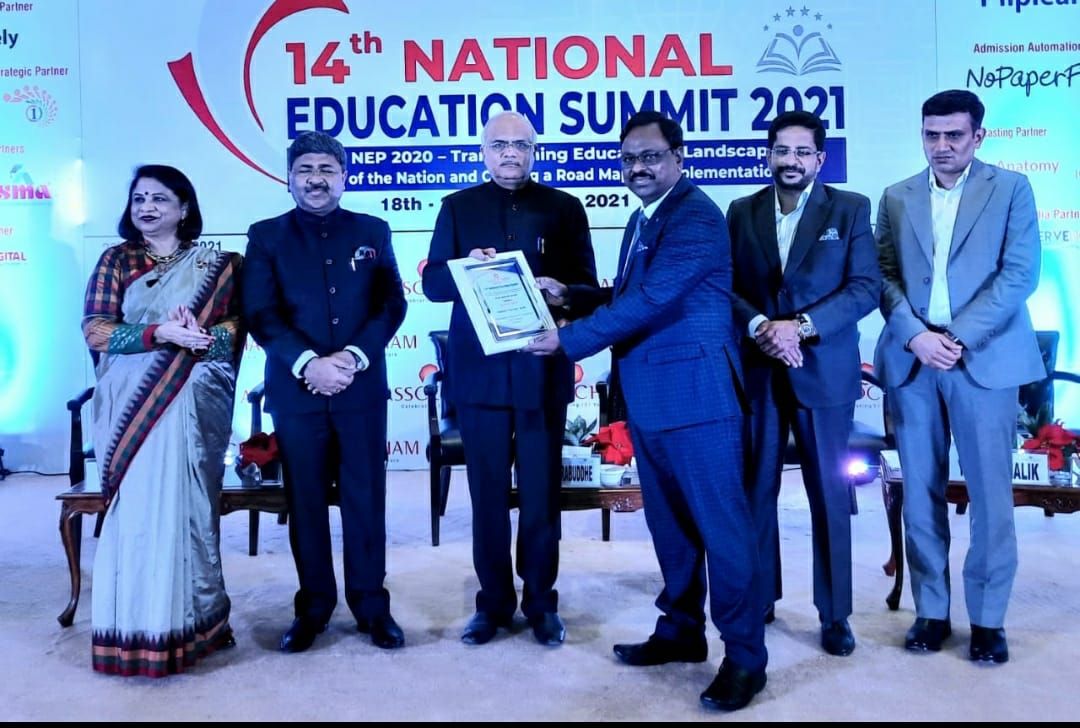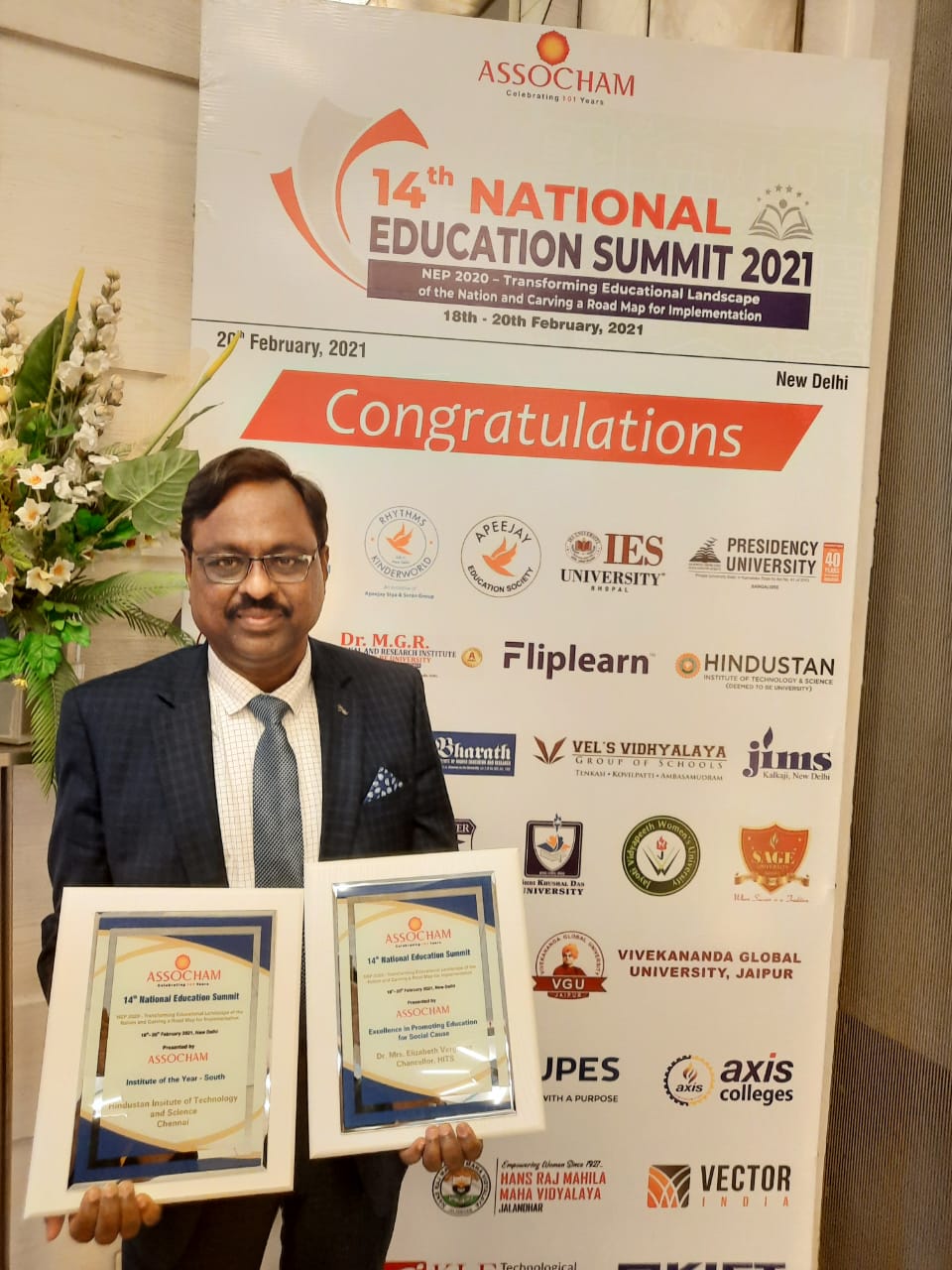-
- Back
-
- Back
-
- Back
-
- Back
-
- Back
-
- Back
-
- Back
-
- Back
14 National Education Summit 2021
14 National Education Summit 2021

14 National Education Summit 2021
“Till date, we’ve been focusing on ‘What to think’ in our education policy.
In the NEP, we are focusing on ‘How to think?’”
- Shri Narendra Modi, Hon’ble Prime Minister of India
ASSOCHAM’s 14th National Education Summit 2021 "NEP 2020 – Transforming Educational Landscape of the Nation and Carving a Road Map for Implementation" brought in a panel of dynamic Educationists from all over the country, to discuss and formulate suggestions to tackle the challenges posed by various aspects of the current Education System. The event honoured Dr. Elizabeth Verghese, Chancellor, Hindustan Institute of Technology and Science with Excellence in Promoting Education for Social Cause Award. Also, Hindustan Institute of Technology and Science was acknowledged with Institute of the Year - South Award. Dr. S. N. Sridhara, Vice Chancellor, Hindustan Institute of Technology and Science received the honours at the summit on 18 Feb. 2021. A Panel of 7 eminent visionists, representing the renowned Institutions of India, put forth their views about the ‘Academic Bank of Credit’ in the Education sector, and brainstormed various suggestions and thoughts to bring out the best in the National Quality of Education, and hence, thereby enhancing the acceptance of Student knowledge on a larger scale. Dr. S.N. Sridhara represented our esteemed Institution in the Summit.
NEP 2020 – TRANSFORMING EDUCATIONAL LANDSCAPE OF THE NATION AND CARVING A ROAD MAP FOR IMPLEMENTATION
DAY & DATE: Thursday, 18 February 2021, 11:00 AM
TOPIC OF PANEL DISCUSSION: Academic Bank of Credit - A Tool to Transform Indian Education System
CO-ORDINATOR:Mr. Neeraj Arora Senior Director & Head ASSOCHAM National Council on Education.
MODERATOR: Mr.Aditya Berlia, Co-founder and Pro-Chancellor, Apeejay Satya University
PANEL:
- Mr. Shankar Vanavarayar, President, Kumaraguru Group of Institutions.
- Dr. S. Shasi Anand, Vice President Kalasalingam Academy of Research and Education..
- Dr. AmarendraPani, Joint Director (Research) Association of Indian Universities (AIU)..
- Dr. S.N Sridhara, Vice Chancellor, Hindustan Institute of Technology and Science (Deemed-to-be-University)..
- Mr. Harsha Kankanala, Professional Doctorate in Engineering Netherlands, Co-Founder –Edwisely.
EXCERPTS OF DR. S. N. SRIDHARA’S TALK
1. As a Vice Chancellor, what are the issues and challenges are you expecting in the entire Academic Bank Implementation? And how can the quality of Education be ensured across the country, focusing on the key challenges you need to overcome?
Dr. S.N Sridharaapproached by tagging the question to be of importance and a matter of great concern. He addressed the issue right from the root by listing the main objectives of ABC, referring to its various sections, emphasizing on the provision of student centric interdisciplinary and multidisciplinary academic mobility, to facilitate the students to choose their own learning path.He then based these objectives to connect to the 5 major challenges posed by the system.
Challenge#1: AcademicPan is practiced by National and International universities by offering Honors (aligned subjects) and Minors (non-aligned subjects) apart from the regular course of studies. The challenged faced due to this is thenon-uniformity in the quality of the content across Universities, as an accreditation, like NAAC, is to be a complete accreditation for the entire college. He left behind a thought for the panel, “If a student chooses a course from a particular department which is not doing so good, then what will happen to the quality of the content?”
Challenge#2: Possibility of repetitive courses and modules, when a student credits a course from multiple platforms, as permitted by ABC.
Challenge#3:The flexibility of guidelines. Stating an example of the guideline“30% from HIE can be taken by a candidate and the remaining 70% can be taken from other institutionsor courses offering agencies” which turns problematic when the individuality of a degree is unattended to under the specified guideline. He pointed this condition with a provision called the Bachelor of Liberal education (BLE), which is not still widely acclaimed and appreciated, compared to the other courses, which forces the students to enter a particular program and start crediting many other courses.
Challenge#4: The limitation of ABC to the courses offered by recognized HIE’s and Agencies. This poses a major challenge as this is only across Indian Universities who can exchange NAAC accreditation at key level, affecting the students relying on distance education from universities abroad, unless duly recognized.
Challenge#5: The shelf life for this academic bankingbeing 5 to 7 years, is a challenge to be tackled as the students might lose the legibility of their course, in a situation of retained credits, at the verge of the completion of the course.
2. How do you ensure that uniform level of quality and trust and what are the major challenges we find while ensuring uniform credit recognition?
Dr. S.N. Sridhara addressed the question with reference to the ABC documentation, about the need to set up a monitoring committee to look at the quality, but he raised a concern over this, by stating an example of Hindustan University. He highlighted the issue the differences in content and delivery, courses from platforms like Coursera, IET, AAA, etc. are integrated with the courses offered by the University, which largely affect the learning outcome of the students, undertaking the course. Students also face issues as they pay the fee, unaware of the content conflicts.He also put forth a challenge, to ensure the proper conduct in choosing a particular subject without choosing the subjects in the previous forms. Another challenge associated with this is the variation of syllabus from one course to another. Dr. S.N.Sridharaalso referred to a challenge posed by a co-speaker, to highlight the issues caused due to Multiple Exit. “If a student quits in his 3rd year of engineering, we might offer a diploma, but the learning outcome from diploma, is completely different from the learning outcome what we can expect from students who is leaving within 3 years out of a 4 years course.” So, these are the major challenges which we are finding by uniform quality recognition.
Moderator’s view:
Mr. Aditya Berlia, affirmed every challenge posed by Dr. S.N. Sridhara, and commented, “All of us as Educators, have to really work with Stakeholders to answer these questions.” He reflected on each challenge and concluded saying, “There needs to be a huge outreach from the Industry also, to educate and to recognize more innovative paths and must learn how to gain trust in the system.”The Panel members had a healthy discussion, marking and examining through every possible challenge, brought in by certain amendments in the Education System, which is hoped to be curbed and looked up with due consideration, in the near future, so as to ensure the uniformity in the quality of Education, across the world.


